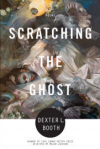Scratching the Ghost
Most of the poems appear to be biographical and the deeper you wade into the pages, the deeper your relationship and understanding of the narrator becomes. One of my favorite poems is titled “Anniversary” and is dedicated “for my mother.” The poem begins:
She puts on her wig like a smile
thrown sideways with the tilt of a little child’s head.
I watch her adjust it like an expression
or a tie, the temperature in a freezing room.
Inside she is worn
like the pages if my favorite books,
her teeth yellowing at the edges of each word
The descriptions are so real that I am in the room sharing a very intimate moment with the narrator and his mother. The poem has a dark edge to it, the reality that as we grow older and as perceptions change, everything changes. No matter how open you are to understanding and trying to get to know someone, some people will always be an enigma, and the future will always be doomed from the start.
In his poem “Waste,” we get more snippets from the narrator’s childhood. It is separated into three parts, this the first:
In first grade, I might have pissed myself because Ms. Jackson said I
could not leave, because we were testing and I might sneak out to a
friend and borrow their book. Maybe I might have sat with my legs
crossed, waiting for the bell to ring, tapped my foot against the chain
of the girl in front of me until she thought I was flirting, and smiled.
I might have pissed myself, I might have been the last kid to the
bus, lying and telling the boys in the back a sprinkler went off under
my crotch. Maybe I said, that smell is from Jerry in science class. He
doesn’t bathe. He farted on my leg. And maybe that’s the truth.
You can just imagine this kid in elementary school cooking up this elaborate story because he doesn’t want to get made fun of by his friends. Even as an adult, the narrator still presents the story without owning up to any realness—just a “maybe it happened and maybe it didn’t, I’ll never tell.” As readers we can all relate to an embarrassing moment of our youth that we fudge the truth on just slightly as we laugh about it in our adult lives. Because deep down it’s still supremely embarrassing, and if we can’t make it out on top, we at least don’t want to be at the very bottom of the pile like Jerry from science class.
Through the book of poetry we see the narrator face many obstacles, navigate through different types of relationships, and mature as a person. One of the final poems, “Queen Elizabeth,” considers not just race, but destiny and who you truly are. Booth presents Ethiopian tradition that some readers might not understand. And with lack of understanding comes fear and judgment. Like any family, humanity has disagreements about religion, race, and other cultural issues—some members so devout in their beliefs, others nonchalant, and others merely questioning. One night at a reading, the narrator runs into a kid who said he doesn’t “want to be a black writer.” And this makes the narrator angry.
But while reading this book, race wasn’t an issue for me at all. I never thought to check the picture on the back of the book to see what color person wrote these brilliant words. Because the entire time, it was all about getting lost in the raw moments. After finishing these 96 pages I found myself cut off from some of the best writing I’ve read in a long time, without a library of work to feed my incessant need for more Dexter Booth. Here’s to hoping he comes out with more entrancing work in the near future.





